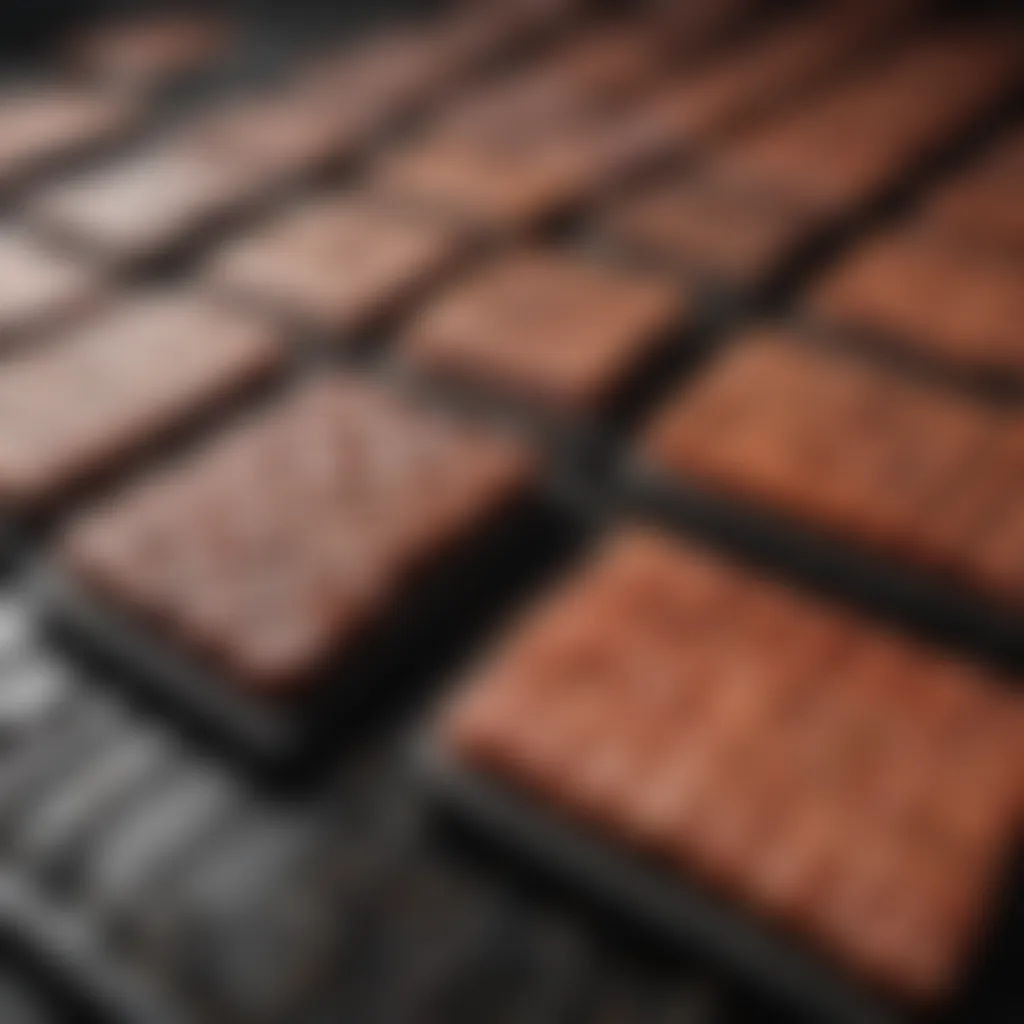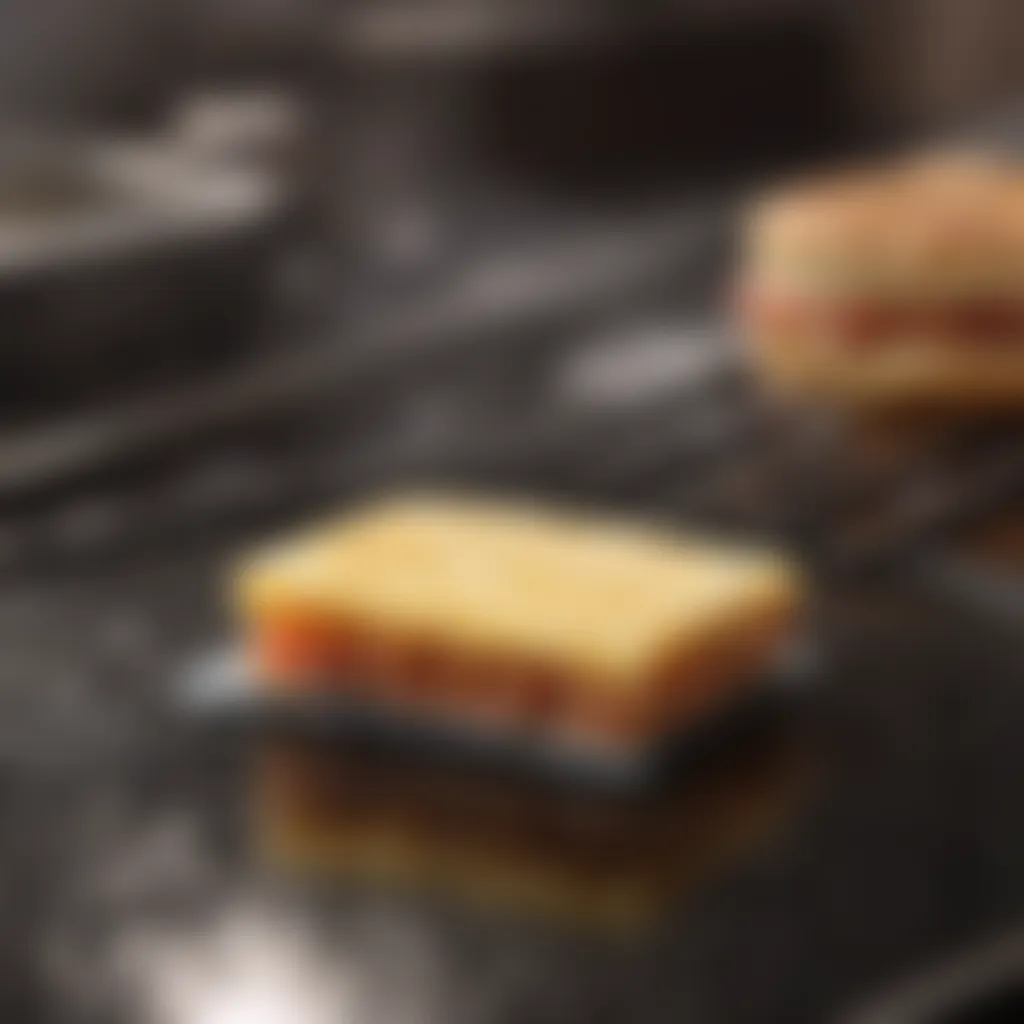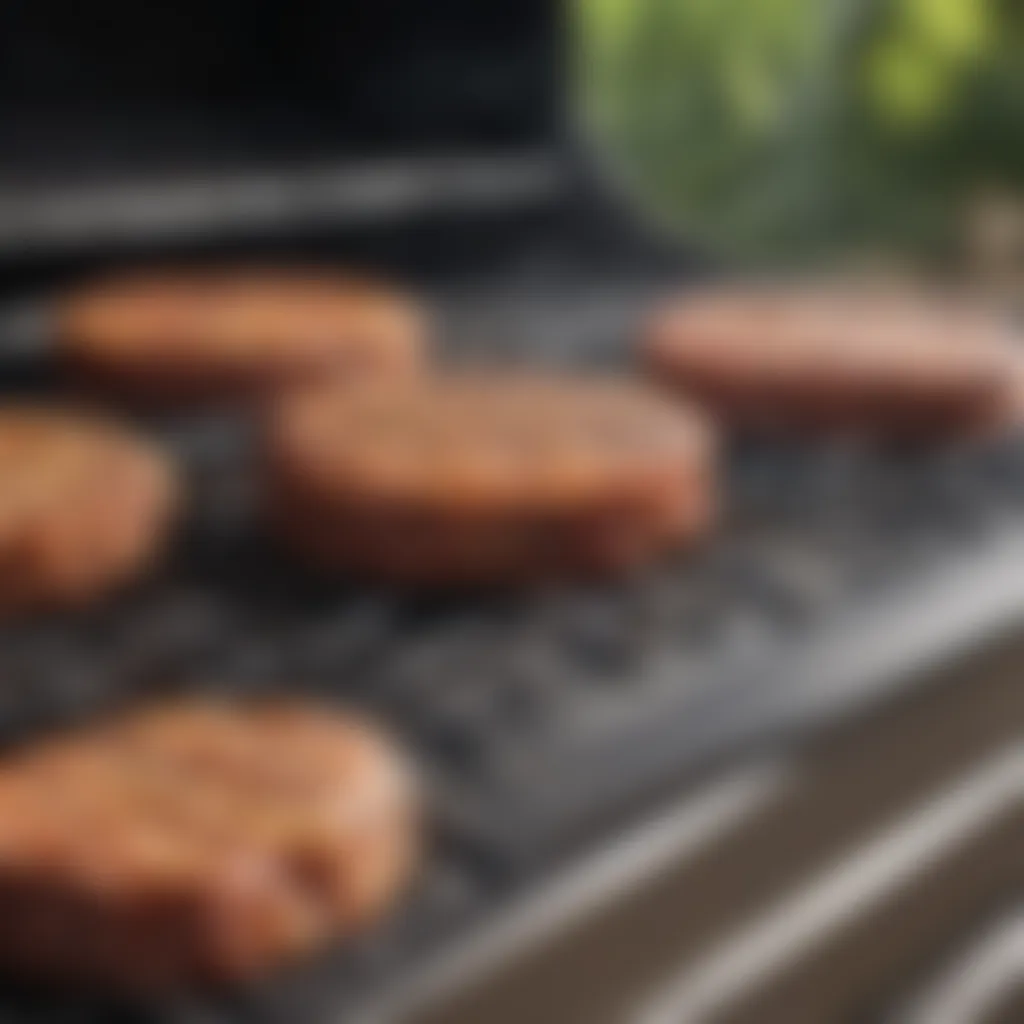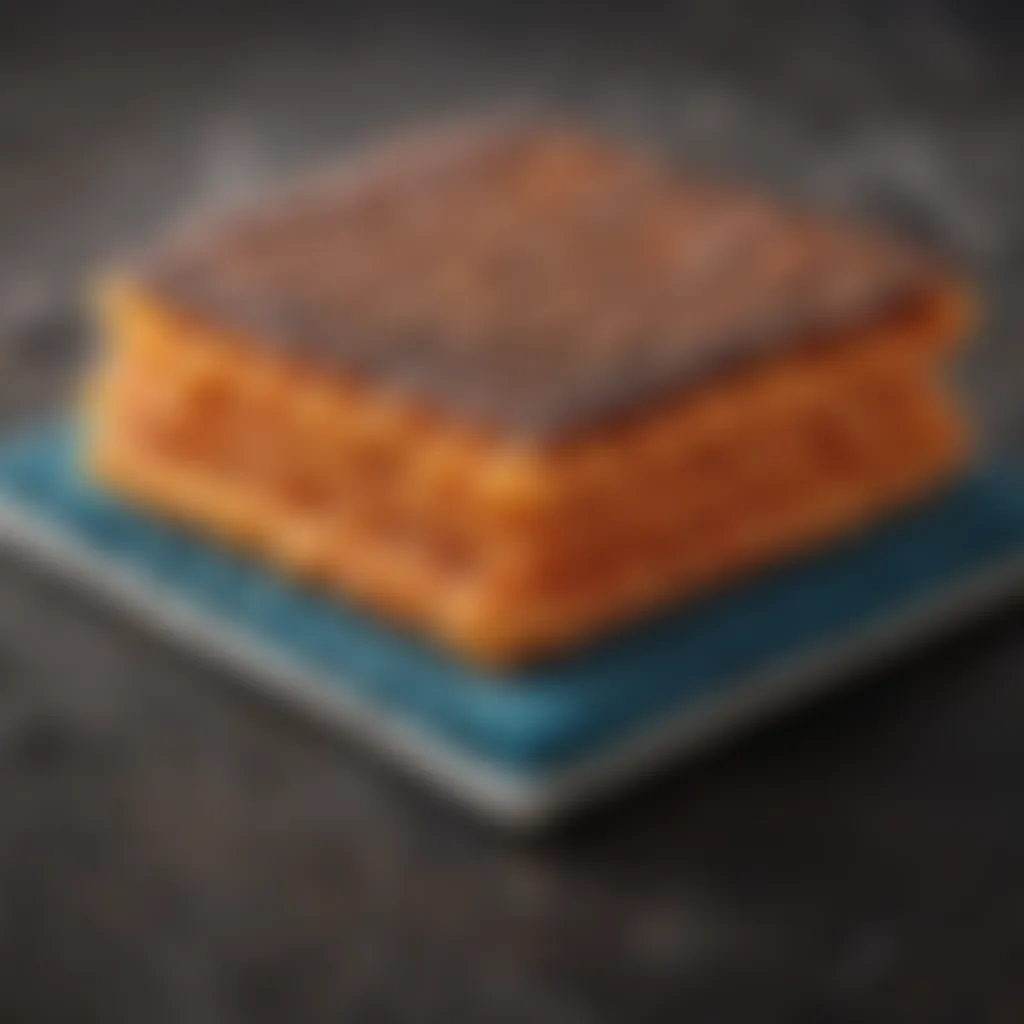The Essential Guide to BBQ Grill Cleaning Pads


Intro
Cleaning a BBQ grill may seem like a mundane task, but in reality, it is essential for maintaining the life and performance of the grill. The presence of grease and residue not only affects the taste of your food but can also lead to dangerous flare-ups. BBQ grill cleaning pads offer an effective solution for this problem. They come in various materials and types, tailored for different cleaning needs, ensuring your grill remains functional and safe.
Understanding the significance of these cleaning tools is key. Not only do they help in removing burnt-on food particles, but they also aid in preserving the overall quality of your grilling equipment. With a clear understanding of how these pads work, along with effective strategies for their use, you can elevate your grilling experience.
In this guide, we will dive into the diverse types of BBQ grill cleaning pads available, their material compositions, and their effectiveness against stubborn grease. We will discuss how to use these pads properly, focus on environmental considerations, and explore innovative alternatives for keeping your grill in top condition.
Let’s find out how these tools can transform your grilling routine.
Prologue to BBQ Grill Cleaning Pads
Maintaining a BBQ grill is essential for several reasons, and understanding the role of cleaning pads in this process is key. Grill cleaning pads help to preserve the functionality and longevity of grilling equipment. They play a significant role in ensuring that your grill operates optimally and remains free of harmful residues.
Regular maintenance prevents issues like uneven heating and flavor transfer from old food residues. Without proper cleaning, grease buildup can also become a fire hazard. This necessitates a reliable method for keeping your grill clean.
Importance of Grill Maintenance
Maintaining a grill goes beyond just aesthetics; it ensures a safe cooking environment. Regular cleaning not only enhances the taste of the food but also improves the overall grilling experience. Grease and grime can accumulate over weeks of use, leading to unpleasant odors and flavors that may ruin your favorite recipes.
Moreover, neglecting maintenance can shorten the lifespan of your grill. When grill components become coated with excessive residue, they may corrode or malfunction over time. Therefore, investing time and effort into regular maintenance yields benefits that far outweigh the inconveniences.
Role of Cleaning Pads in Maintenance
BBQ grill cleaning pads serve as a vital tool in this maintenance routine. They are designed to tackle the hard-to-reach areas of grills, helping to effectively remove stubborn grease and food particles. These pads come in various materials, each offering its distinct advantages.
Using the correct type of cleaning pad ensures that surfaces are cleaned without causing damage. For instance, non-abrasive pads are ideal for porcelain grills, while steel wool pads might be more suited for cast iron surfaces.
Types of BBQ Grill Cleaning Pads
Understanding the types of BBQ grill cleaning pads is essential for effective grill maintenance. Different materials cater to specific cleaning needs, ensuring that your grill remains in optimal condition. Here, we will explore four main categories of cleaning pads: synthetic fiber, natural fiber, steel wool, and non-abrasive pads. Each type has its own advantages and considerations.
Synthetic Fiber Pads
Synthetic fiber pads are widely used due to their durability and efficiency. Made from materials like polyester and nylon, these pads can handle tough stains and grease spots. They are often designed for repeated use, making them a cost-effective option. The stiffness in synthetic fibers can penetrate tight spaces on grates, allowing for a deeper clean.
However, it's important to choose the right synthetic pad. Some can scratch or damage delicate surfaces. Always check the manufacturer's specifications to determine compatibility with your grill type. Proper rinsing is also crucial to maintain their longevity.
Natural Fiber Pads
Natural fiber pads, often crafted from materials like coconut coir or cotton, offer a gentler cleaning option. These pads are less aggressive and are suitable for delicate grill finishes. Their eco-friendliness is another significant advantage, as they are biodegradable and cause minimal environmental impact.
Natural fiber pads are highly absorbent, making them ideal for wiping down surfaces after grilling. They do not leave behind residues, ensuring a clean and safe cooking area. However, they may not be as effective against heavy build-up compared to synthetic options and may require more frequent replacement.
Steel Wool Pads
Steel wool pads present a powerful cleaning solution for the most stubborn grease and residue. The fine steel fibers can tackle baked-on grime, providing a deeper clean than many other options. However, caution is necessary when using these pads. They can scratch stainless steel and porcelain coatings, potentially damaging the grill's surface.
It's advisable to reserve steel wool for heavily soiled areas, rather than regular cleaning. Ensure that you proceed gently, focusing only on the affected spots. Steel wool does wear down over time and should be replaced regularly to maintain efficiency.
Non-Abrasive Pads


Non-abrasive pads are designed for those who prioritize the protection of their grill's surfaces. These pads typically use soft materials that do not scratch or mar the finish. Their construction is ideal for regular use on any grill type, including non-stick surfaces.
Though they are less effective at removing tough grime compared to steel wool or synthetic pads, non-abrasive options excel at maintaining a clean appearance. These pads can generally be used safely on all grill types, reducing the risk of damage.
In summary, selecting the right BBQ grill cleaning pad involves understanding your grill's material and the level of cleaning required. Each type of pad comes with its own set of benefits and limitations, making it essential to choose wisely based on your individual needs.
"Choosing the right cleaning pad can greatly extend the life of your grill and improve cooking performance."
By knowing these types, you can maintain a clean and efficient grilling environment.
Material Composition of Cleaning Pads
Understanding the material composition of BBQ grill cleaning pads is crucial. It directly influences their cleaning efficiency, durability, and even their environmental impact. The materials used in these cleaning implements play a key role in determining how well they can lift and remove grease, grime, and food residues from grill surfaces. Moreover, certain materials can affect how gentle or abrasive the pads are, which can be critical in maintaining the integrity of the grill surfaces over time. For housewives tasked with the upkeep of grilling equipment, being aware of the materials helps in making informed choices that align with their cleaning needs.
Common Materials Used
BBQ grill cleaning pads can be made from a variety of materials, each with unique characteristics. Here are some common materials:
- Synthetic Fibers: Often made from polyester or nylon, these pads are robust and effective for tough cleaning jobs. They offer resistance to heat and do not easily break down during use.
- Natural Fibers: Materials like cellulose or coconut husks provide an eco-friendly option. These pads are biodegradable and tend to be gentler on surfaces but may require more effort to clean stubborn stains.
- Steel Wool: These pads can be very effective in removing tough, baked-on residue. However, their abrasive nature may scratch the surfaces of some grills, so caution is needed.
- Non-Abrasive Pads: Typically made with a softer foam or microfibre, these pads are designed to provide effective cleaning without damaging delicate surfaces.
Understanding these options helps in choosing the right pad based on the grill type and the nature of the grime.
Environmental Impact of Materials
The material composition also raises essential considerations regarding environmental impact. Each type of cleaning pad affects the environment differently:
- Synthetic materials: While effective, synthetic pads do not biodegrade easily and contribute to landfill waste. Their production often involves chemicals that may affect the environment.
- Natural materials: These are generally more environmentally friendly. They breakdown faster and can avoid leaving a significant ecological footprint.
- Reusable options: Some brands offer pads made from materials that can be cleaned and reused, reducing waste in the long run.
"Choosing eco-friendly cleaning pads can significantly reduce your carbon footprint and promote sustainable cleaning practices."
Consideration of these environmental impacts can guide housewives toward more responsible cleaning choices, aligning with broader household sustainability goals. Opting for pads with lower environmental impact can enhance the overall approach to BBQ maintenance.
Effectiveness of BBQ Grill Cleaning Pads
Understanding the effectiveness of BBQ grill cleaning pads is essential for anyone who frequently grills. Proper cleaning not only extends the lifespan of grill equipment but also ensures better tasting food. When grease and residue accumulate on the grill, they can affect performance, flavor, and hygiene. This section will delve into the specific elements that contribute to the effectiveness of these cleaning tools, focusing on their benefits and what to consider for optimal results.
Performance Against Grease
Grease is one of the most challenging substances to remove when it comes to grill maintenance. A thorough cleaning is crucial to avoid flare-ups and ensure even cooking. BBQ grill cleaning pads excel in cutting through tough grease due to their design and material composition. For instance, synthetic fiber pads are known for their durability and ability to absorb and lift grease effectively. The texture of these pads allows for deep scrubbing without damaging the grill surface.
When selecting a pad, consider the following factors:
- Material: Synthetic fiber pads often have better grease-cutting power than their natural counterparts.
- Size and Shape: Choose a pad that fits your grill grate properly for more efficient cleaning.
- Presence of Additives: Some pads come with cleaning agents built-in, which can enhance their ability to tackle grease.
Overall, the performance of BBQ grill cleaning pads against grease is a critical factor that should influence your choice of cleaning supplies.
Efficacy on Different Grill Surfaces
Different types of grills come with various surfaces that might require specialized care. For instance, cast iron, stainless steel, and porcelain-coated grates have distinct cleaning needs. BBQ grill cleaning pads must match these surfaces to ensure effective cleaning without causing damage.
- Cast Iron Grates: Steel wool pads work well on cast iron but require a gentle touch to prevent scratching.
- Stainless Steel Grates: Non-abrasive pads are ideal here, as they can efficiently clean without leaving behind scratches or marks.
- Porcelain-Coated Grates: Utilize soft cleaning pads to protect the surface, preserving the porcelain layer while still achieving a thorough clean.


In summary, using the right type of BBQ grill cleaning pad on appropriate surfaces enhances cleaning efficacy. A degree of caution is warranted, as not all pads suit every surface. Be mindful of the specific requirements dictated by your grill type to maintain both cleanliness and the integrity of the grill.
"Cleaning pads are not just tools; they are essential to keeping your grilling experience both enjoyable and safe."
Techniques for Proper Usage
Understanding Techniques for Proper Usage of BBQ grill cleaning pads is crucial for maintaining your grilling equipment. Proper usage ensures not just cleanliness but also prolongs the life of the grill and the cleaning pads themselves. This section will detail pre-cleaning steps, cleaning procedures, and post-cleaning care, equipping you with the knowledge necessary to execute an effective cleaning routine.
Pre-Cleaning Steps
Before you start cleaning, certain preparations are necessary. First, ensure the grill is completely cool to the touch. This reduces the risk of burns and injuries. Next, remove any large food particles from the grill surfaces. A scraper or brush might work well for this. Having your cleaning materials ready, including the chosen cleaning pads, a bucket of warm, soapy water, and protective gloves, will help streamline the process.
It’s essential to choose the right pad for the surface you are cleaning. For instance, synthetic fiber pads are often safer for porcelain-coated grids, while steel wool pads are more effective on stainless steel. Understanding these details helps you avoid damaging your grill.
Cleaning Procedure
Once you have completed the pre-cleaning steps, it is time to proceed with the actual cleaning process. Here, you should dampen your cleaning pad in warm, soapy water. Too much soap can leave residues, so use a mild detergent. Apply pressure and scrub the grill grates thoroughly, focusing on areas with stubborn grease buildup. For corners and edges, using a pad or tool tailored for tight spaces might be beneficial.
Tip: Always work in sections. This not only ensures you don’t miss areas but also avoids overwhelming the pad.
After scrubbing, rinse the grill grates well with clean water to remove any soap residues. If necessary, repeat the process for particularly tough spots. For any residue you can’t remove, let the grill soak for a short period with the pad on it before scrubbing again.
Post-Cleaning Care
After you conclude your cleaning session, maintenance does not stop. Rinse out your cleaning pads thoroughly, ensuring you remove all soap and residue. Allow the pads to dry completely before storing them. This step is essential, as moisture can lead to mold or bacteria growth, which could compromise the next cleaning session and health.
For your grill, it’s advisable to lightly coat the grates with oil post-cleaning to maintain their condition and prevent rusting. Also, consider storing your grill in a dry, sheltered area if possible.
Overall, applying these techniques will not only enhance the effectiveness of the cleaning process but will also contribute to a safer and more delightful grilling experience.
Common Pitfalls in Grill Cleaning
Grill cleaning is not merely a chore; it is a crucial maintenance practice that directly affects the performance and longevity of your BBQ grill. However, despite the apparent simplicity of the task, several pitfalls can undermine its efficacy. Understanding these common mistakes is essential for achieving optimal cleanliness and maintaining the integrity of your grill.
Using Wrong Cleaning Materials
The choice of cleaning material plays a pivotal role in the grill cleaning process. Using inappropriate materials may lead to unwanted damage. For instance, steel wool can scratch the surface of stainless steel grills, leaving unsightly marks. Similarly, harsh chemicals can weaken the grill's coating, which may lead to corrosion over time.
To avoid these issues, always opt for cleaning pads that are specifically designed for BBQ grills. These pads typically feature a balance between abrasiveness and gentleness, effectively removing grease and residue without causing any harm to the grill's surface. A consideration of the grill type is also essential; ceramic and cast iron surfaces may demand more delicate treatment.
Neglecting Safety Precautions
Safety is paramount during the cleaning process. Many grills may still harbor residual heat even after cooking. Not taking the time to ensure that the grill is cool can lead to burns or other injuries. Additionally, when using cleaning products, proper ventilation is crucial. Fumes from cleaning agents can be hazardous, particularly in confined spaces.
Wearing gloves can protect the hands from irritation caused by cleaning agents. Eye protection is also advisable, especially if you are using sprays or foams that may cause splashes.
Remember, prioritizing safety measures not only protects you but also enhances the overall cleaning experience.
By avoiding the pitfalls of using improper materials and neglecting safety precautions, you can enhance the longevity of your grill and simplify your cleaning routine. Make informed choices to ensure that your BBQ grill remains a reliable cooking companion.
Innovative Alternatives to Cleaning Pads


In the pursuit of effective grill maintenance, exploring innovative alternatives to traditional cleaning pads can provide essential insights. These alternatives often present unique benefits that not only enhance the cleaning process but also make it more eco-friendly and cost-effective. Understanding these alternatives is valuable for anyone committed to maintaining their grill without compromising on quality or the environment.
Homemade Solutions
Homemade cleaning solutions stand out as a popular option for grill enthusiasts. They can be created using basic materials commonly found around the house. One of the primary advantages is cost-efficiency. You can save money while ensuring a clean grilling surface. Here are some effective homemade solutions:
- Baking Soda Paste: Mixing baking soda with water to create a thick paste can effectively tackle tough grease and burnt residue. Apply it directly to the grill surfaces and scrub gently with a sponge or cloth.
- Vinegar Solution: A mixture of vinegar and water provides a natural acidity that cuts through grime. Using a spray bottle, spray the solution onto grill grates and wipe away the residue.
- Lemon Juice: The acidity in lemon juice acts similarly to vinegar. It not only cleans but also adds a fresh scent.
Using such homemade solutions is not only effective, but it also reduces reliance on chemical-laden products that can harm both health and the environment. Ensuring thorough rinsing after application is vital to prevent any residues from being left on the grill.
Alternative Commercial Products
For those preferring ready-made solutions, several alternative commercial products offer excellent cleaning capabilities without the use of traditional cleaning pads. These products often incorporate eco-friendlier ingredients or enhanced formulas designed for specific grill materials. Here are some options:
- Cleansing Sprays: Many brands produce sprays specifically formulated for grills. These sprays often contain natural ingredients that break down grease effectively while being less harmful than conventional chemicals.
- Grill Wipes: Available in pre-soaked formats, grill wipes provide a convenient way to clean surfaces quickly. They are designed to be effective yet gentle enough not to damage the grill finish.
- Eco-Friendly Foam Cleaners: Some products use a foaming action to lift debris and grease from grill surfaces. Look for those labeled as biodegradable to ensure environmental compliance.
Adopting these alternatives can lead to a significant positive impact on the environment. It is essential, however, to read labels and ensure that the products used align with personal cleaning preferences and safety standards.
Choosing the right cleaning method can extend the life of your grill and ensure that each cookout is safe and enjoyable.
Longevity and Maintenance of Cleaning Pads
Understanding the longevity and maintenance of BBQ grill cleaning pads is essential for maximizing their effectiveness and ensuring a cleaner grilling experience. Proper care not only extends the life of these cleaning tools but also significantly improves their performance, thus safeguarding your grill from the harmful effects of grease build-up and residue. Several factors come into play when considering how to maintain these pads.
Routine cleaning is one primary consideration. Just like any kitchen tool, grill cleaning pads can collect dirt and contaminants, which, over time, could lead to ineffective cleaning. Proper maintenance includes rinsing these pads after each use to remove grease residues. This extra step can prevent bacteria growth, which can have negative effects on the food you prepare. Furthermore, it improves the pads’ overall longevity, allowing them to serve their intended purpose for a longer time.
Another significant aspect of maintaining these pads lies in their storage. Where we store our cleaning products can impact their efficacy. Pads should be kept in a dry, well-ventilated area away from direct sunlight; exposure to high temperatures can deteriorate the materials much quicker. Using airtight containers can also enhance their lifespan by preventing dust and moisture from affecting the materials in the pads.
To summarize, proper longevity and maintenance techniques ultimately lead to a more effective and reliable grilling experience.
Storing and Caring for Cleaning Pads
Correct storage practices greatly influence the lifespan of BBQ grill cleaning pads. Here are a few effective tips:
- Store pads in a cool, dry area.
- Use airtight containers to keep out moisture and contaminants.
- Avoid keeping pads near heat sources or direct sunlight.
- If possible, hang pads up instead of stacking them to prevent distortion.
By following these simple steps, you can ensure that your cleaning pads remain in their best working condition for longer.
Signs to Replace Pads
As with all cleaning tools, knowing when to replace your BBQ grill cleaning pads is crucial. Over time, even with proper maintenance, these pads will wear down. Here are some key signs to look for when considering a replacement:
- Fraying or tearing: Visible damage to the pad's fibers indicates reduced effectiveness.
- Loss of texture: When pads no longer have a scrubbing texture, they will not clean surfaces effectively.
- Stains that won't wash out: If the pads retain stubborn stains even after cleaning, it's time to replace them.
By being attentive to these signs, you can maintain optimal cleaning efficiency and protect your grill investment effectively.
Remember: Proper care and timely replacements contribute significantly to the overall maintenance of your barbecue equipment.
Closure
In this article, we explored the critical role of BBQ grill cleaning pads in maintaining your grilling equipment. Their significance goes beyond simple cleanliness. A clean grill not only enhances the flavor of your food but also prolongs the lifespan of your grill. The proper use of cleaning pads ensures that grease and residue do not build up, which can affect heating efficiency and flavor.
Summary of Key Points
- Importance of Maintenance: Regular cleaning is essential for optimal grill performance. A clean grill allows for effective cooking and reduces the risk of flare-ups caused by leftover fats.
- Types of Cleaning Pads: Understanding the different types of cleaning pads—like synthetic, natural, steel wool, and non-abrasive—helps in choosing the right one for your grill’s surface. Each type caters to specific needs and should be selected based on the grill material and level of grime.
- Material Composition: The materials used in making cleaning pads have implications for durability and effectiveness. Consideration of environmental impacts is also essential, especially with increasing awareness of eco-friendly products.
- Techniques for Usage: Proper techniques enhance the effectiveness of cleaning pads. Pre-cleaning steps, the right cleaning procedures, and post-cleaning care ensure the longevity of both pads and grills.
- Common Pitfalls: Awareness of mistakes, such as using incorrect materials or neglecting safety, can save time and resources. Understanding these pitfalls enables better practices for maintaining your grill.
- Innovative Alternatives: Exploring homemade solutions and alternative products expands options for sustainable cleaning practices and may offer cost-effective choices.
- Longevity of Cleaning Pads: Knowing how to store and care for your cleaning pads can extend their lifespan. Recognizing warning signs for replacement helps in maintaining cleaning efficiency.
Final Recommendations
- Choose Wisely: Invest in high-quality BBQ grill cleaning pads that are suitable for your specific grill type.
- Regular Cleaning: Establish a routine for cleaning your grill after each use to minimize the buildup of grime.
- Safety First: Always prioritize safety precautions while cleaning. Avoid abrasive pads on sensitive grill surfaces unless it's appropriate.
- Explore Alternatives: Consider ecological options when selecting cleaning products. This helps in reducing your environmental footprint while keeping your grill in top shape.
- Monitor Condition: Regularly assess the state of your cleaning pads and replace them when they show signs of wear. This ensures optimal cleaning performance.







